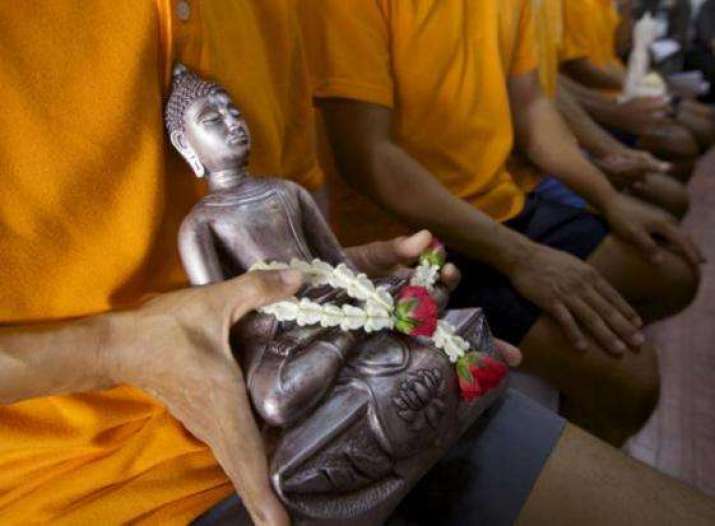NEWS
Buddhist-themed Sculpture Course Helps Thai Convicts Rehabilitate
 An inmate at Bang Kwang Central Prison prepares to give one of his Buddhist statues to his parents. From bangkokpost.com
An inmate at Bang Kwang Central Prison prepares to give one of his Buddhist statues to his parents. From bangkokpost.comA Buddhist-themed sculpture course at Bang Kwang Central Prison in Thailand’s Nonthaburi Province is teaching prisoners self-reform through a combination of art, religion, and self-reflection. The project, which now engages 30 prisoners, was launched by the Corrections Department of the Thai Ministry of Justice, with the aim to help the inmates heal and reform.
For some of the inmates, working on a Buddhist sculpture can be a daunting task as it requires them to reflect on their past mistakes. As one of the inmates, describes: “It took immense willpower to face the piece of sculpture I was working on.” Now aged 27, he is in prison for murdering someone six years ago. (Bangkok Post)
He describes how, as he works with the clay, he is slowly able to break away from his past, realizing just how “vague and nonsensical” his life before prison had become. As he learned how to shape and manipulate the inanimate clay into sacred forms and figures, he began to realize that he also had the ability to determine and shape his own destiny. Now, seven months into the project, he is looking forward to what the future may hold.
“People who think they only need to serve themselves and satisfy their own needs are gravely mistaken,” he observed, adding that he now feels that life has greater value when it includes altruistic acts. (Bangkok Post)
“It’s not an easy job to make a Buddhist statue for people to pay their respects to,” added another prisoner. Such a task could only be accomplished if the artist, a prisoner, is truly capable of purifying his heart. Having found a real appreciation for the art, he mentions that he plans to continue sculpting in the future. (Bangkok Post)
“This project has changed all of them,” said Phusit Rattanaphanop, a sculptor who helps to teach the convicts. (Bangkok Post)
Amon Chanthabut, the father of the 27-year-old prisoner, said the statue his son had made was now part of his family’s devotional shrine: “It represents happiness and my son’s return to the correct path.” (Bangkok Post)
Amon also shared his sons newly found passion for Buddhist art, and is applying his furniture-making skills to crafting life-sized Buddhist images from wood in his free time. For him, engaging with Buddhist art in this manner is one of the greatest curatives for his son’s previous misdeeds.
According to the Bangkok Post newspaper, more Thai prisoners are turning toward religion to purify their minds. Reflecting on their past crimes, many of the sculpture students are adopting Buddhist principles in their day-to-day lives as they work to reform themselves.
The Prison Mindfulness Institute, an organization providing meditation and mindfulness programs in prisons around the world, also visits the Bang Kwang Central Prison, organizing meditation sessions that help prisoners by integrating purpose and meaning back into their lives.
A public display of some of the Buddha sculptures made by the prison inmates is planned for next month.
See more
Inmates seek redemption in art (Bangkok Post)
Bangkok Shambhala (Prison Mindfulness Institute)
Related news from Buddhistdoor Global
Buddhism the Fastest-growing Religion in Scottish and English Prisons
Refuge Recovery Groups in the US Use Mindfulness and Meditation to Fight Addiction
Mindfulness Meditation Helps Singaporean Children Cope with Stress
Thai Military Court Defers Lèse-Majesté Charges Against Prominent Buddhist Activist Sulak Sivaraksa
Buddhist Transitional Community in Pennsylvania Offers Refuge for Former Convicts
Related features from Buddhistdoor Global
Rare 15th–16th Century Murals and Sculptures Found in Sichuan Province Shed New Light on Tibetan Art
Healing the Wounds of War with Love and Compassion
Mindful Britain: Building a Happier Country
Stepping into the Mandala – A Journey to Ankor Wat
Loving your Tick: Book Review of Mindfulness as Medicine














